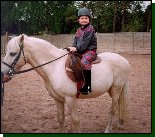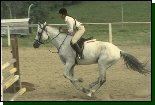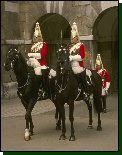
 A Window on ...
A Window on ...Horse Riding
 |
 A Window on ... A Window on ...Horse Riding |
| The activities you take part in will depend on your level of ability and what your instructor feels you are capable of. These notes outline what is involved for beginners and gives brief details of what you can expect as an intermediate and advanced rider. | ||||||||||||
 | Beginners If you have never been on a horse before, the instructor will show you how to mount, 'get on', and dismount, 'get off', a horse correctly and safely. To stop the horse from moving you must keep hold of the reins. The instructor or an assistant may also have the horse on a lead for extra control. If you have never been on a horse before, the instructor will show you how to mount, 'get on', and dismount, 'get off', a horse correctly and safely. To stop the horse from moving you must keep hold of the reins. The instructor or an assistant may also have the horse on a lead for extra control. When you are safely mounted, the instructor will explain how you should position yourself in the saddle and how to hold the reins. You will also practice several balancing exercises before your horse takes its first steps. All of these procedures are for your own safety and security on the horse and will become important when you learn how to control your horse.
Lessons are often given in groups of three or more so most riders soon become accustomed to working within a group. However, as you become more experienced, the group exercises will become more involved. There are lots of opportunities to practice controlled movements in a group session. Only when you have sufficient balancing skills, will your instructor let you start to canter. | |||||||||||
 | Intermediate Riders Once you have the basic skills of riding outlined in the Beginners section, you can begin to learn other skills. They will depend on your interests. Some riders like to extend their experience by hacking out in the countryside or on the road. New skills are needed and there are new obstacles to face such as controlling your horse on different surfaces or through water, or coping with traffic. Once you have the basic skills of riding outlined in the Beginners section, you can begin to learn other skills. They will depend on your interests. Some riders like to extend their experience by hacking out in the countryside or on the road. New skills are needed and there are new obstacles to face such as controlling your horse on different surfaces or through water, or coping with traffic. Some riders are interested in jumping and again this involves learning new seat positions and body movements. | |||||||||||
 | Advanced Riders It takes many years to become an advanced rider and work with highly trained horses. Those who do often make horses their life and are highly involved in working with, riding or training horses. It takes many years to become an advanced rider and work with highly trained horses. Those who do often make horses their life and are highly involved in working with, riding or training horses. Advanced riders can be seen at many of the wonderful sporting events and competitions around the world, taking part in show jumping, dressage, three-day events or horse racing to name a few. Able riders are also used in the police services of many countries and the mounted cavalry divisions of the armed forces. All these disciplines require different types of skill, many years of practice, dedication and a love of horses. | |||||||||||
| ||||||||||||
 | ||||||||||||
|
| ||||||||||||